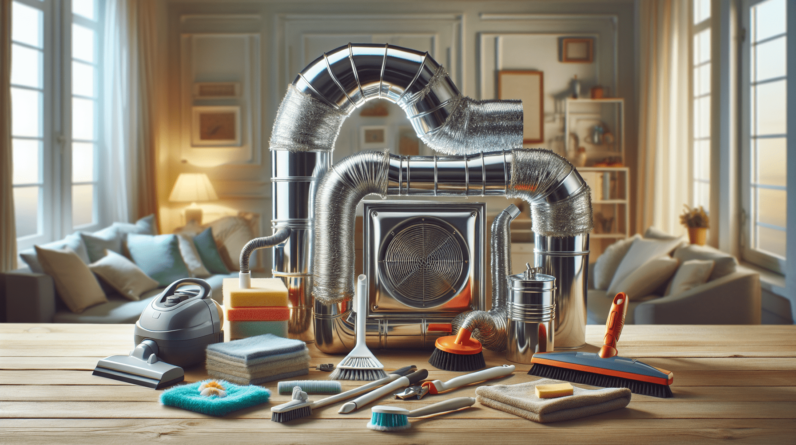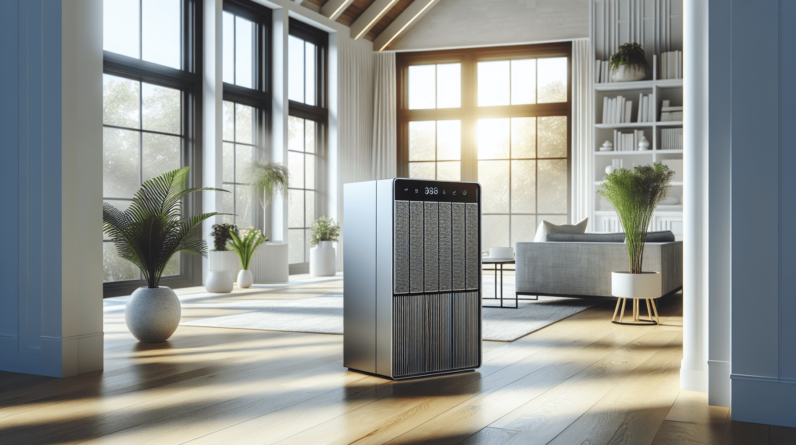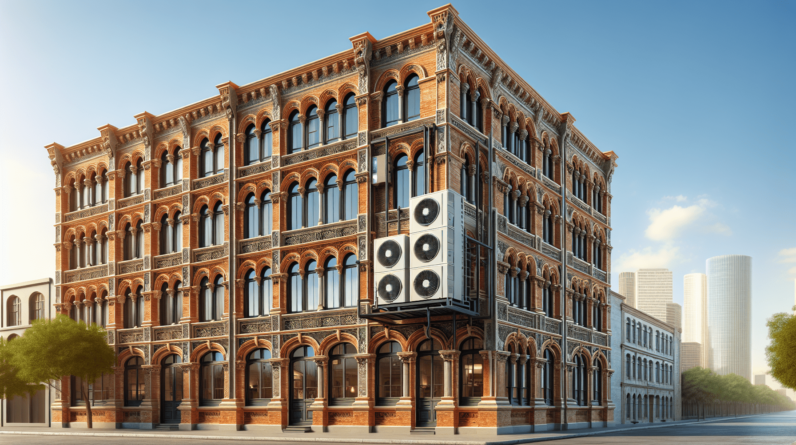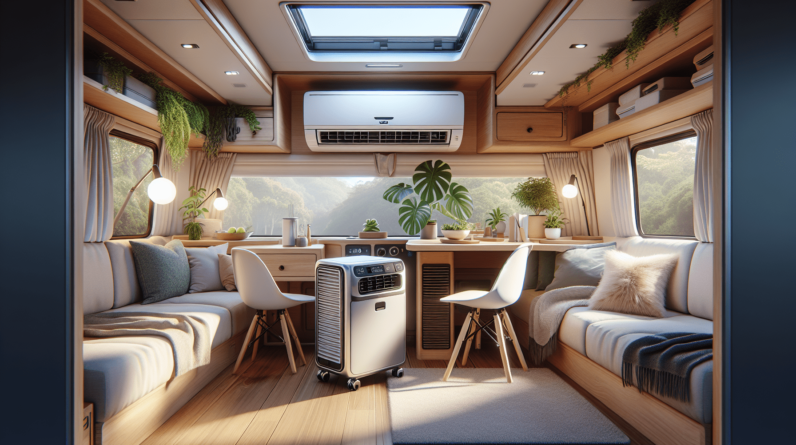

Have you ever found yourself sweating inside your camper during a sweltering summer day? Staying comfortable in your camper can be challenging when the heat rises, especially during those hot months. That’s where an air conditioner comes into play. Knowing how to choose the right air conditioner for your camper can make all the difference in making your trips enjoyable.
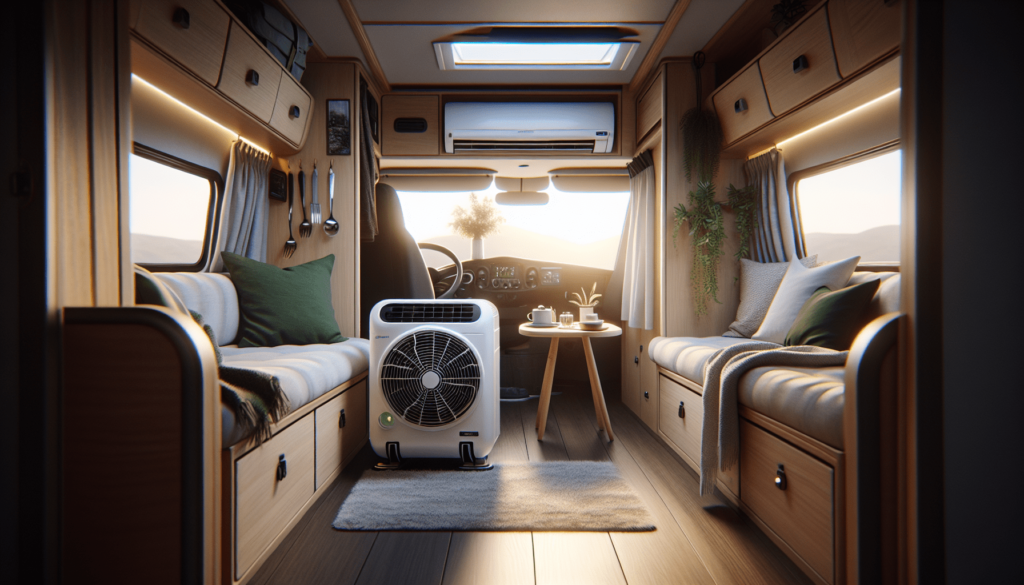
Understanding Your Needs
Before you jump into picking the perfect air conditioner, it’s important to understand your specific needs. Consider the size of your camper, the climate you’ll be traveling in, and how often you camp in hot weather.
Camper Size
The size of your camper directly influences the type of air conditioner you’ll need. Air conditioners are measured in BTUs (British Thermal Units), which tell you how much cooling power the unit has. A larger camper requires more BTUs to keep it cool effectively.
- Small campers (under 100 square feet): 5,000 – 7,000 BTUs should suffice.
- Medium campers (100 – 200 square feet): About 7,000 – 10,000 BTUs.
- Large campers (over 200 square feet): 10,000 BTUs and higher may be necessary.
Climate Considerations
Think about the regions you usually travel to. If you’re camping in hotter, more humid areas, you’ll need a unit with higher BTUs compared to cooler regions. Additionally, if you’re camping in areas with extreme fluctuations in temperature, your air conditioner needs to accommodate those changes.
Frequency of Use
If you plan to frequently camp in hot weather, investing in a high-quality air conditioner can save you from discomfort and make your trips more enjoyable. Conversely, if you only occasionally travel during summer, a portable or less expensive option might suffice.
Types of Air Conditioners for Campers
There are several types of air conditioners available for campers, each with their pros and cons. Understanding these can help you make an informed choice.
Rooftop Air Conditioners
Rooftop air conditioners are some of the most popular options for RVs and campers. They are mounted on the roof and have the advantage of not taking up any interior space.
Pros:
- Space-saving: Since they sit on the roof, you have more interior space.
- Powerful cooling: These units are generally powerful and can cool larger spaces.
Cons:
- Installation: Installing a rooftop unit can be complex and may require professional help.
- Weight: They add weight to your camper, which can affect your fuel efficiency.
Portable Air Conditioners
Portable air conditioners are a flexible option that you can move around inside your camper. These units often come with an exhaust hose that needs to vent outside.
Pros:
- Mobility: You can easily transfer them between different areas in your camper.
- Easy setup: Most portable units can be set up without professional help.
Cons:
- Space: They take up valuable floor space in your camper.
- Limited coverage: They may not cool larger spaces as effectively as rooftop units.
Window Air Conditioners
Window air conditioners are another option, designed to fit in a window opening. This might not be suitable for all campers, but if you have the right fit, they can be an effective choice.
Pros:
- Cost-effective: Typically, window units are more affordable than rooftop options.
- Energy-efficient: Many units are built to save energy while providing effective cooling.
Cons:
- Installation: Installing a window unit may require modifications to your camper.
- Space limitations: They can only cool the area directly around them.
Energy Efficiency and Power Consumption
When selecting an air conditioner for your camper, energy efficiency is an essential factor. You want a unit that cools efficiently without consuming excessive power.
Energy Efficiency Ratio (EER)
The Energy Efficiency Ratio (EER) is a rating that tells you how effectively an air conditioner uses energy. To find the EER, divide the BTU rating by the power consumption in watts. A higher EER means better energy efficiency.
| EER Rating | Energy Efficiency Level |
|---|---|
| 10 – 11 | Fair |
| 12 – 14 | Good |
| 15+ | Excellent |
Make sure to look for units with a high EER rating; these units will save you money on energy costs over time, especially when camping in hot areas.

Power Source
Consider how your camper will power the air conditioner. Most units are electric, so you’ll need to make sure your camper can support the power requirements. Do you have a generator? Are you plugged into a power source at your campsite? Answering these questions will help guide your decision.
Installation Considerations
Once you’ve selected the right air conditioner for your camper, it’s crucial to think about its installation.
Rooftop Unit Installation
Installing a rooftop air conditioner can be a project that requires technical knowledge. If you’re comfortable with DIY tasks, you might manage the installation without professional help. However, if you’re uncertain, hiring a professional can ensure that it’s done safely and correctly.
Here are a few key steps to consider:
- Measure the space: Ensure that your camper’s roof can accommodate the air conditioner.
- Seal the roof: A watertight seal is essential to prevent leaks.
- Electrical connections: Ensure proper wiring and connections, following the manufacturer’s instructions.
Portable Unit Setup
Setting up a portable air conditioner is relatively straightforward. Here’s how you can do it:
- Choose the right location: Position the unit near a window, which allows for proper ventilation.
- Vent the exhaust: Connect the exhaust hose to the window frame to vent hot air outside.
- Plug it in: Make sure it’s powered correctly and check that you have sufficient electricity in your campsite.
Window Unit Installation
If you decide to go for a window air conditioner, the installation process will involve:
- Finding the right window: Make sure the window can support the weight and has appropriate dimensions for the unit.
- Securing the unit: Follow the manufacturer’s instructions to ensure the unit is secure and airtight.
- Powering the unit: Make sure you have a suitable electrical connection.
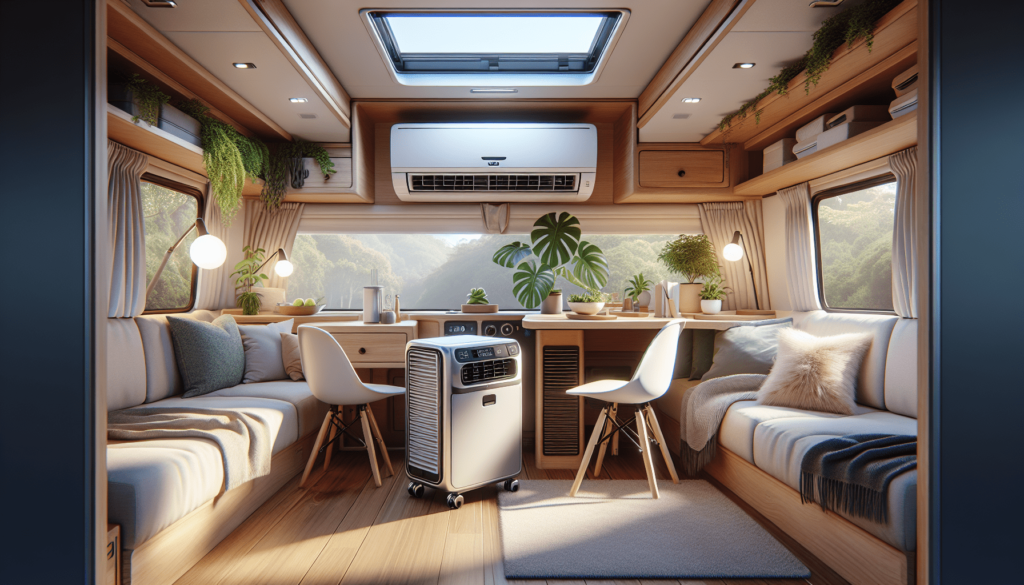
Maintaining Your Air Conditioner
Regular maintenance will help your air conditioner perform optimally and extend its lifespan. Here are some essential tips to keep in mind.
Cleaning the Filters
Air filters are crucial for maintaining good air quality and efficient operation. You should check and clean or replace them regularly, ideally every few weeks.
Inspecting the Coils
Both evaporator and condenser coils need to be cleaned periodically to remove dirt and debris. Dirty coils can hinder cooling efficiency, making your air conditioner work harder than necessary.
Checking Refrigerant Levels
Low refrigerant can significantly impact the performance of your air conditioning unit. If you suspect low levels, it’s best to contact a professional for support.
Seasonal Preparation
Before and after the camping season, check the overall condition of your air conditioner. Running a few tests can help ensure that everything is functioning properly.
Factors Impacting Performance
Many elements can influence the effectiveness of your air conditioner. Being aware of these can help you improve its performance.
Insulation
Good insulation is vital for keeping your camper cool. If the walls, roof, and floors are inadequately insulated, warm air can easily infiltrate. Consider upgrading your camper’s insulation if it feels hotter than expected.
Sun Exposure
If your camper is parked in direct sunlight, it will absorb more heat. To improve cooling efficiency, try to park in shaded areas whenever possible or use reflective covers.
Internal Heat Sources
Appliances inside your camper can generate heat. Be cautious of using the stove or oven during the hottest parts of the day. Consider other cooking methods to keep your space cooler.
Camping Considerations with an Air Conditioner
Once you have your air conditioner, make the most out of your camping experience. Here are some tips.
Choosing the Right Campsite
When camping, choosing a spot that allows for adequate airflow can improve cooling performance. Trees can provide the shade you need, but ensure you’re not obstructing your air conditioner’s exhaust.
Using a Generator
If your air conditioning unit requires more power than what’s available at your campsite, investing in a generator can be a wise decision. When selecting a generator, make sure it has the capacity to power your air conditioner as well as other devices you may want to run.
Planning Around Weather
Always check the weather before you head out. Understanding the expected temperatures can help you prepare more effectively in advance. If you anticipate extreme heat, consider additional cooling options.
Troubleshooting Common Issues
Even with regular maintenance, you may encounter some issues with your air conditioner. Here’s how to troubleshoot common problems.
Not Cooling Properly
If your air conditioner isn’t cooling your camper effectively, check the following:
- Filters: Are they clean, or is it time to change them?
- Coils: Are they dirty or blocked?
- Power supply: Is it getting the required power?
Strange Noises
Unusual sounds can indicate mechanical issues. If you hear rattling, buzzing, or grinding, it might be time to have a professional inspect your unit.
Water Leaking
Leaks can occur if there’s a blockage in the drain line or if the unit isn’t installed correctly. Address leaks immediately to prevent water damage in your camper.
Conclusion
Choosing the right air conditioner for your camper can significantly enhance your camping experience. Whether you favor a rooftop, portable, or window air conditioning unit, understanding your specific needs is key. Consider factors like size, climate, efficiency, and installation to find the perfect match for your camper.
Taking proper care of your air conditioner through maintenance and troubleshooting will keep it working smoothly for many summers ahead. So the next time you’re on an adventurous road trip, you’ll have that added comfort of a cool breeze ready to make your experience enjoyable, no matter how hot it gets outside. Happy camping!

